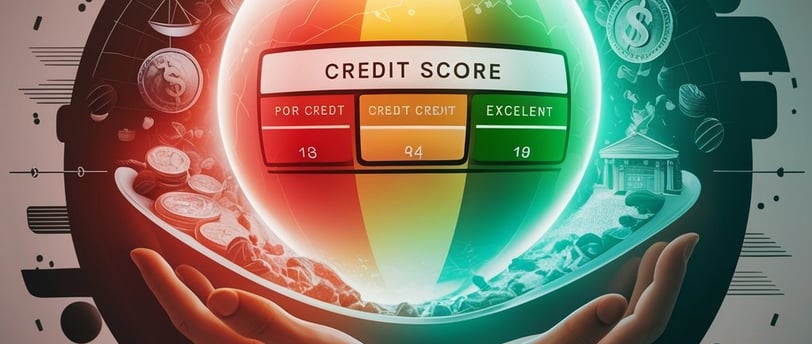The Beginner's Guide to Understanding Credit Scores
4/19/20243 min read


The Beginner's Guide to Understanding Credit Scores
When it comes to personal finance, one of the most important factors that lenders consider is your credit score. Your credit score is a three-digit number that represents your creditworthiness and helps lenders determine whether you are a reliable borrower. Understanding credit scores is essential for anyone who wants to take control of their financial future. In this guide, we will demystify credit scores, explain their impact, and provide steps to improve your creditworthiness.
What is a Credit Score?
A credit score is a numerical representation of your creditworthiness based on your credit history. It is calculated using various factors such as your payment history, credit utilization, length of credit history, types of credit used, and new credit accounts. The most commonly used credit scoring model is the FICO score, which ranges from 300 to 850. The higher your credit score, the better your creditworthiness.
The Impact of Credit Scores
Your credit score has a significant impact on your financial life. Lenders use your credit score to determine whether to approve your loan applications and what interest rate to offer you. A higher credit score can result in lower interest rates, which can save you thousands of dollars over the life of a loan. Additionally, your credit score may also affect your ability to rent an apartment, secure insurance coverage, or even get a job.
It's important to note that different lenders may have different criteria and weightings when evaluating credit scores. However, the following general guidelines can give you an idea of how credit scores are typically interpreted:
Excellent (800-850): Lenders consider individuals with excellent credit scores to be low-risk borrowers.
Very Good (740-799): Individuals with very good credit scores are also considered low-risk borrowers.
Good (670-739): This range is considered average, and most borrowers fall into this category.
Fair (580-669): Borrowers with fair credit scores may face higher interest rates and stricter lending criteria.
Poor (300-579): Individuals with poor credit scores may have difficulty obtaining credit or may need to pay significantly higher interest rates.
Improving Your Creditworthiness
If you have a less-than-perfect credit score, don't worry. There are steps you can take to improve your creditworthiness over time:
1. Pay Your Bills on Time
Your payment history is one of the most crucial factors in determining your credit score. Make sure to pay all your bills, including credit card payments, loans, and utilities, on time. Late payments can have a negative impact on your credit score.
2. Reduce Your Credit Utilization
Credit utilization refers to the amount of credit you are currently using compared to your total available credit. Aim to keep your credit utilization below 30% to demonstrate responsible credit management. Paying down your credit card balances can help improve your credit utilization ratio.
3. Establish a Long Credit History
The length of your credit history is another important factor in calculating your credit score. If you are new to credit, consider opening a credit card or becoming an authorized user on someone else's credit card to start building a positive credit history.
4. Diversify Your Credit Mix
Having a mix of different types of credit, such as credit cards, loans, and a mortgage, can positively impact your credit score. However, only take on new credit accounts if you can manage them responsibly.
5. Monitor Your Credit Report
Regularly check your credit report for errors or fraudulent activity. You are entitled to one free credit report from each of the three major credit bureaus (Equifax, Experian, and TransUnion) every year. Dispute any inaccuracies you find to ensure that your credit report is an accurate reflection of your creditworthiness.
Conclusion
Understanding credit scores is the first step towards improving your financial well-being. By knowing how credit scores are calculated and the impact they have on your financial life, you can take proactive steps to improve your creditworthiness. Paying your bills on time, reducing your credit utilization, and establishing a long credit history are just a few ways to boost your credit score. Remember, improving your credit score takes time and discipline, but the benefits are well worth the effort.
